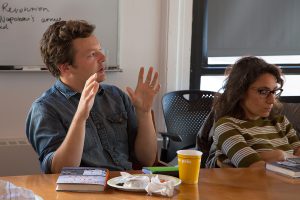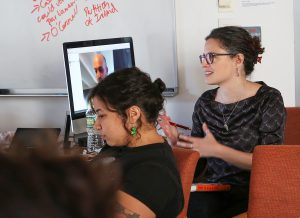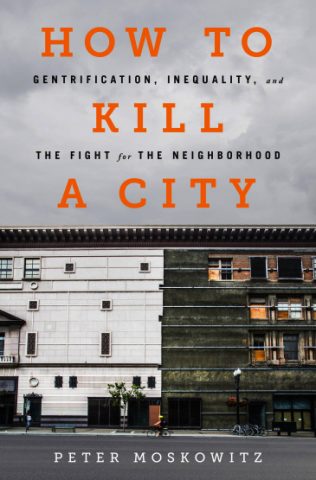What is perhaps most remarkable about Peter Moskowitz’s book, How to Kill a City: Gentrification, Inequality, and the Fight for the Neighborhood is its accessibility and simplicity. Moskowitz joined the Urban Democracy Lab for a discussion on October 4, 2017. He presented on his new book, answered questions, and led a discussion on gentrification and housing justice movements.
Gentrification is a notoriously nebulous, complicated, and heated topic that is difficult to define and link historically. It is also something that is necessarily defined in terms of place, because it is so specific to the space that it is occurring in, and yet it is universal and follows similar patterns in many cities across the United States and the world. It is also, as Moskowitz shows clearly, a violent act, predicated on systems of oppression and colonization that have persisted for centuries. As Moskowitz says with regards to New York City, his hometown, “It became clear that for most poor New Yorkers, gentrification wasn’t about some ethereal change in neighborhood character. It was about mass evictions, about violence, about the decimation of decades-old cultures” (4).
For anyone that hasn’t experienced the effects of gentrification firsthand, the narratives that Moskowitz tells make the experience and the violence viscerally real, and for those who have, who are currently fighting, he offers a way of understanding how our cities have gotten to this place, and what we can do about it.

Moskowitz powerfully links four cities in his descriptive exploration of gentrification, and its causes, effects, and futures. He brings together the post-Katrina landscape of New Orleans, the post-bankruptcy state of Detroit, the post-tech boom layout of San Francisco, and the post-1970s/1980s bankruptcy era of New York into a unified narrative of gentrification. As he points out, it’s important that these cities are all post- something, often pushed into high-gear gentrification by a destructive event or set of policies. Gentrification does not come out of the blue, but is instead linked to the reality of history, both recent and past. It is remarkable that Moskowitz brings together these cities and understands them both separately and as part of an interconnected view of gentrification. Too often gentrification is looked at in a specific neighborhood or city without being seen in the larger context of its effects elsewhere and the patterns that repeat time and time again.

This ease and ability to describe difficult topics simply translates over to Moskowitz’s down-to-earth personality and presence. He joined the discussion with the Urban Democracy Lab via Skype (due to a broken down car on the way to NYC from Philly) for the lunchtime event. Most importantly, he stressed the ways in which gentrification works from the idea that capital and economic growth are more important than working-class people in cities, specifically that “people who are not profitable to a city are therefore not valuable to a city”. After a question about gentrification as a modern form of colonization, Moskowitz elaborated to say that the project of the United States is inherently about creating profit—essentially taking things, privatizing them, and making money from that. Gentrification is not something new—it is built on concepts of colonization that continue to this day in the United States, retaining the old forms and adding on new morphed and destructive forms.

Moskowitz’s force and raw anger comes in part from his own story and from witnessing the destruction gentrification is causing across the country. His story is one where he recognizes himself as both part of the first wave of gentrifiers, but also as someone who has felt the effects of gentrification deeply in his childhood neighborhood and home of the West Village. He brings this personal experience, technical understanding, and the stories of people across these four cities into a powerful narrative that brings gentrification out of the realm of specific neighborhoods or specific scholarly discourse and into a clear and passionate call to save our cities. His book and his perspective are an honest look at gentrification, and he calls for an explicitly anti-capitalist model of cities moving forward. Moskowitz sees the possibilities for more anti-capitalist movements, as well as a push for systemic change. His book and perspective is an important step in this change, illuminating the lived causes and effects of gentrification, and giving the knowledge for people to actively act on the futures of the cities we love and belong to.

